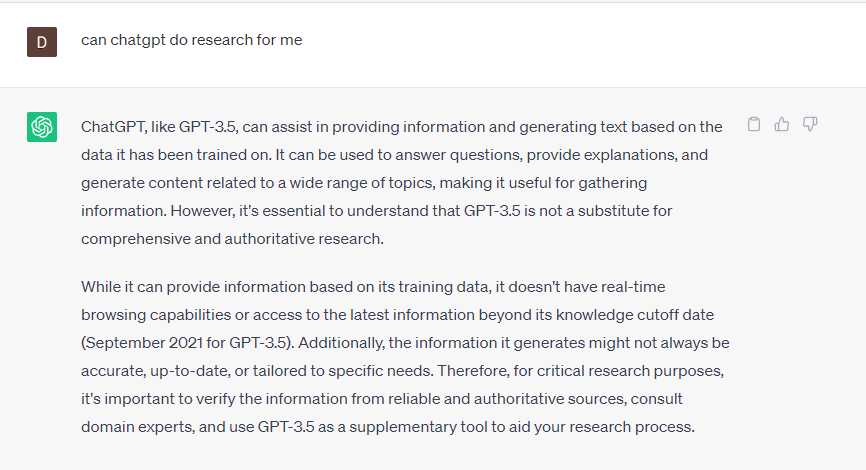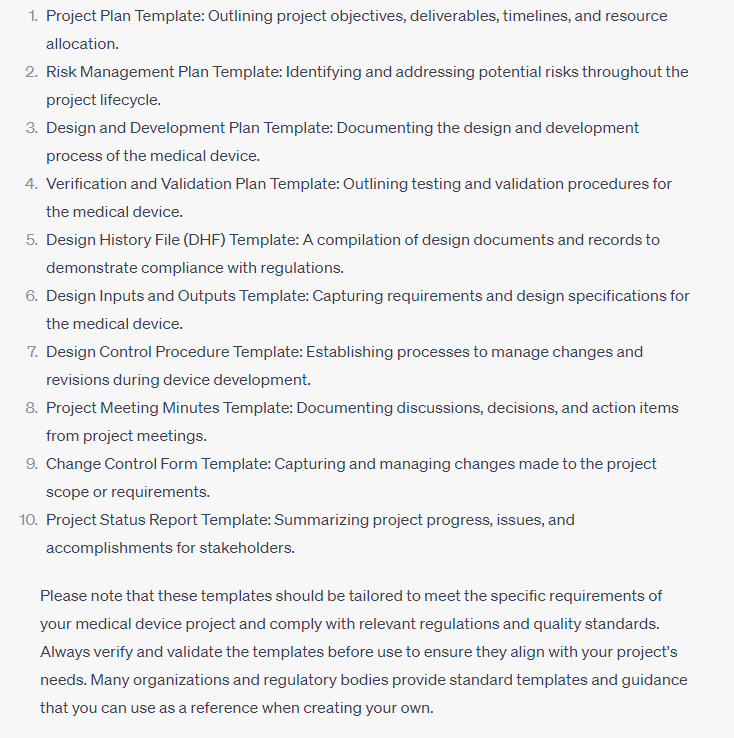
While AI-powered project management tools have been on the market in recent years, the advent of OpenAI and GPT4 has made things much easier. There are various ways GPT4/ChatGPT can help medical device companies. If used correctly, these tools can make project management faster, enabling medical device project managers to take on more and focus purely on the human tasks of strategic thinking, decision-making, and creativity.
This is article number 2 in our AI and medical device series. Catch up on article number 1: Your Guide to use ChatGPT for medical device project management here.
Here are the 7 ways ChatGPT Can Help Medical Device Companies Save Time
1. Research and information gathering for medical device projects
Besides gathering information from different viable sources, GPT4 can also summarize entire research papers into key information required for your medical device. It can go as far as analyzing them. Saving your team hundreds (if not more) hours of digging through information and compiling it for proof or knowledge.
It can be used to gather information on:
- relevant regulations and guidelines that medical device projects must adhere to in different regions.
- the design process, materials, and technologies used in medical device development.
- different testing methods, validation procedures, and quality control measures for medical devices.
- market trends, competitors, and potential target audiences for the medical device.
- post-market monitoring and reporting requirements for medical devices.
plus so much more
However, it’s not always accurate. And that’s not me saying it. It’s GPT itself!

Plus, there have been incidents of GPT providing false or incorrect attribution and sources.
An alternative is to use Bing AI instead. It uses the same open AI source code and gives you source links that you can then follow to its original source. However, the number of questions you can ask in a day is limited.
2. ChatGPT can help with medical device project planning and scope:
ChatGPT’s predictive analytics capabilities can help predict project outcomes, offering valuable insights for the future. But that’s not all. Chat GPT can make project planning more efficient by:
- outlining project objectives, deliverables, and timelines based on the information provided.
- helping with financial planning, estimating costs, and managing project resources efficiently.
However, the accuracy will depend on the amount and type of information you feed it.
It can also provide documentation templates for medical device project management that you can customize for your project. Here’s a list of templates GPT4 says it can offer:

Note the warning at the end. It says, “Please note that these templates should be tailored to meet the specific requirements of your medical device project and comply with relevant regulations and quality standards. Always verify and validate the templates before use to ensure they align with your project’s needs. Many organizations and regulatory bodies provide standard templates and guidance that you can use as a reference when creating your own.”
Remember this🔼🔼
Project managers can use this as a base to build their project on. The project team can tweak these templates based on their needs and project requirements.
3. Meeting support
While ChatGPT doesn’t have real-time access to join meetings or interact with live events – unless you involve a third party plugin that uses the openAI source code – it can still help in multiple ways.
Based on the input provided, it can draft an agenda for the meeting. When provided with a meeting transcript, it can also assist in summarizing and organizing the information. Besides this, it can help with preparing reports, creating action item lists, or generating follow-up emails.
However, it is important to remember that while it can mimic human interaction, ChatGPT is not human (yet! Laughs nervously). And as such, understanding nuances and making critical decisions still require human involvement.
Once all the meeting materials are prepared, it can even send the meeting summaries to stakeholders and help with follow-up questions and communication.
Which brings us to point number 4.
4. Stakeholder engagement and communication
While communication is the currency of leadership, it’s not a bad idea to let AI do some of the heavy lifting. Especially when it comes to editing emails or important drudge work like follow-up, reporting, or answering repeat questions. Here are some ways, ChatGPT can help with stakeholder engagement.
- Drafting clear and concise emails and messages conveying project updates, status reports, or seeking feedback.
- Generating reports summarizing project progress, key milestones, and other relevant information.
- Creating slide decks to communicate project plans, outcomes, or results to stakeholders.
- Addressing common queries by providing quick and accurate responses to frequently asked questions.
- Language translation. This one was new for us too!
- Converting technical jargon into simple language, making it easier to communicate with non-technical stakeholders.
It can even edit your emails for better engagement. For example, it can make a very formal email sound informal or vice versa.
Have you ever prompted ChatGPT to help you deal sensitively with frustrating clients? Someone we know did, and here are the results!🔽🔽
They asked GPT4 to convert “You already have all the freaking info, just use it and stop wasting my time asking for it again and again” into a polite email they could send their clients. Here’s what it spit out:
“to ensure efficiency and avoid redundancy, kindly review the materials I have previously shared before addressing what is missing”
Now that’s what I call a good use of technology.
Source: Giphy.com
5. ChatGPT can help medical device companies with risk management
If fed the right details, GPT4 can assist in identifying potential risks associated with the project and suggest risk mitigation strategies. It can also provide information on relevant regulatory guidelines and standards related to medical device risk management, ensuring adherence to necessary requirements. Plus assist in determining appropriate risk control measures and designing strategies to minimize or prevent potential hazards.
However, as risk management is a critical part of medical device projects (not to mention a highly sensitive one) its better to have a human project manager review everything.

However, GPT4 has a big privacy problem. It logs every conversation you have with it, including any personal or confedential data you share. ChatGPT’s privacy policy makes it clear that it records your conversations and shares the logs with other companies and its AI trainers. Thus making sharing confidential data with it almost impossible.
6. Medical device project managers can use ChatGPT as a brainstorming/jumping off board
Since we have covered most of these in the previous points, we will keep this brief. You can use ChjatGPT as a great brainstorming tool. If you ask it the right questions, it can give you the information and resources to build your project. You can also use it as a highly smart team member or assistant and go back and forth with it for ideas
7. ChatGPT can help medical device companies with task support
All the information listed above makes it evidently clear that ChatGPT can help with task support.
- coming up with milestones and ways to track them
- allocating tasks based on team competencies
- creating project reports and tables that can be exported to the right tools to create Gant charts etc.
- generating training materials
are some other ways it can provide task support.
While Chat GPT definitely makes things more efficient it is worth noting that:
- It can never replace human employees and project managers – yet.
- The data you feed it is not confidential.
- It can’t make decisions for you.
- Answers are only as accurate as the data it has and the data you feed it.
- There’s always room for error so every output needs to be reviewed.
And I know just where you can find a project manager who can do all that, plus more.
Contact Waddell Group
Our mission at Waddell Group is to provide exemplary project management consultants to clients in medical devices and other regulated industries. This gives companies access to great project leaders on an “as needed” basis. And an opportunity for gifted project leaders to work on projects outside an organization’s politics and other “non-project” related issues.
